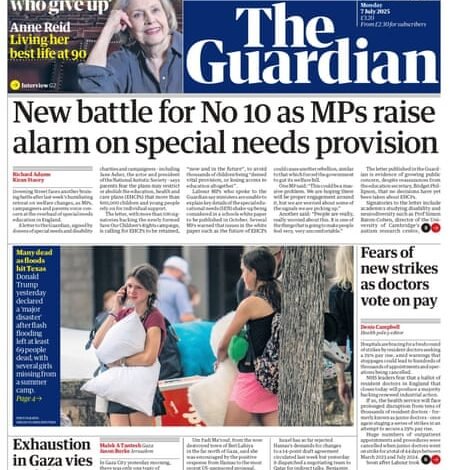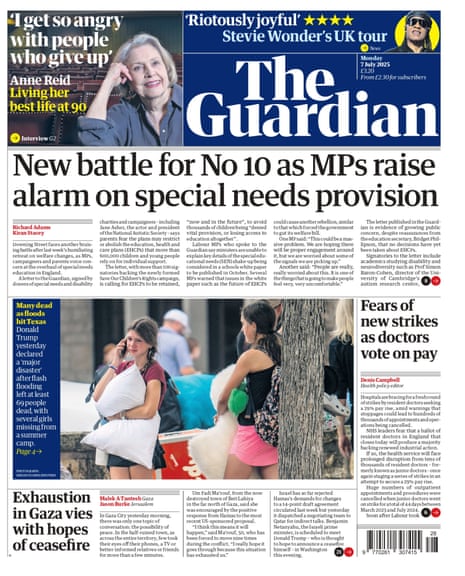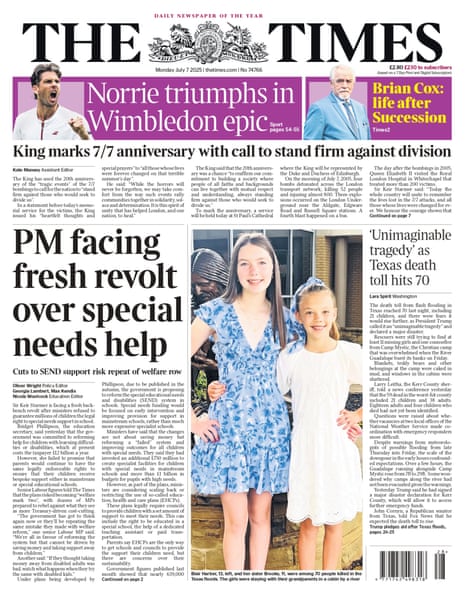Minister won’t rule out support cuts for children with EHCPs amid Send overhaul – UK politics live | Politics

Minister won’t rule out support cuts for children with EHCPs amid Send overhaul
Good morning. Less than a week after the government had to abandon the main pillar of its welfare reform plans 90 minutes before a vote it was otherwise likely to lose, the government is now facing another revolt over plans to scale back support available to disabled people. But this row affects children, not adults – specifically pupils with special educational needs who have education, health and care plans (EHCPs) that guarantee them extra help in schools.
As Richard Adams and Kiran Stacey report, although the plans have not been announced yet, campaigners are alarmed by reports that access to EHCPs is set to be restricted.

The Times has splashed on the same issue.

The Times quotes an unnamed senior Labour MP saying: “If they thought taking money away from disabled adults was bad, watch what happens when they try the same with disabled kids.”
Stephen Morgan, the early education minister, was giving interviews this morning. He was supposed to be talking about the government’s Giving Every Child the Best Start in Life strategy being announced today, but instead he mostly took questions on EHCPs.
On Times Radio, asked if he could guarantee that every child who currently has an EHCP would continue to keep the same provisions, Morgan would not confirm that. Instead he replied:
We absolutely want to make sure that we deliver better support for vulnerable children and their parents and we’re committed to absolutely getting that right. So it’s a real priority for us.
When it was put to him that he was not saying yes, he replied:
Well of course we want to make sure that every child gets the support that they need. That’s why we’re doing the wider reform and we’re publishing the white paper later this year.
Here is the agenda for the day.
Morning: Nigel Farage attends a meeting of Kent county council where his party, Reform UK, is in power.
11.30am: Downing Street holds a lobby briefing.
11.30am: Keir Starmer and other leaders attend a memorial service at St Paul’s Cathedral in London to commemorate the 20th anniversary of the 7/7 attacks.
2.30pm: Yvette Cooper, the home secretary, takes questions in the Commons.
If you want to contact me, please post a message below the line when comments are open (normally between 10am and 3pm at the moment), or message me on social media. I can’t read all the messages BTL, but if you put “Andrew” in a message aimed at me, I am more likely to see it because I search for posts containing that word.
If you want to flag something up urgently, it is best to use social media. You can reach me on Bluesky at @andrewsparrowgdn.bsky.social. The Guardian has given up posting from its official accounts on X, but individual Guardian journalists are there, I still have my account, and if you message me there at @AndrewSparrow, I will see it and respond if necessary.
I find it very helpful when readers point out mistakes, even minor typos. No error is too small to correct. And I find your questions very interesting too. I can’t promise to reply to them all, but I will try to reply to as many as I can, either BTL or sometimes in the blog.
Key events
Farage claims any flaws in Reform UK’s candidate vetting process ahead of 2024 general election not his fault
Nigel Farage has insisted that he was not to blame for any flaws in Reform UK’s candidate vetting procedures ahead of the 2024 general election.
On a visit to Kent county council, Farage said that any vetting errors were not his fault because he was not party leader when candidates were being chosen. Farage founded the party but it was mostly led by Richard Tice during the last parliament, until Farage resumed control when he decided to return to frontline politics during the 2024 campaign.
Vetting has become an issue because James McMurdock, one of five Reform UK MPs elected at the election, announced at the weekend he has given up the party whip pending an investigation into two Covid loans he obtained during the pandemic. Murdock said the loans were obtained lawfully and in compliance with the regulations and that he was only resigning the whip as a “precautionary measure” to protect the party’s reputation.
Another of the five Reform MPs elected in July last year has already left the party. Rupert Lowe was accused of misconduct, but he claimed the allegations were false and the police dropped the matter after an investigation.
Asked about the McMurdock allegations, Farage told reporters:
Let’s find out the truth. I know as much about this right now as you do.
He said he would be heading to Westminster later to find out more about the situation.
Talking about candidates generally, Farage said:
I came in, I inherited this situation where hundreds of candidates who stood in the last general election had not gone through a vetting process.
I said on 5 July, the day after the election last year, that we would now professionalise.
We put 1,630 candidates into the field on 1 May, more than any other party with very, very few rows or arguments – so the vetting process worked for this year, I can’t apologise for what happened before.
Addressing his Kent council colleagues, who now run the council, Farage said:
Behaving with integrity is a responsibility upon all of you, although that doesn’t mean you all have to become stuffed shirts or anything like that.
You are holders of public office you are responsible and how we behave matters.
Reform UK leader Nigel Farage is applauded by members of Kent County Council, during his visit to the Reform UK group at Kent at Kent County Council at County Hall, Maidstone. Picture date: Monday July 7, 2025. PA Photo. Photo credit should read: Gareth Fuller/PA Wire Photograph: Gareth Fuller/PA
No 10 says it is still working to remove tariffs on UK steel and aluminium exports to US
Downing Street has refused to say if the government is confident a deal to eliminate American tariffs on UK steel will be struck ahead of a deadline this week.
Donald Trump plans to start implementing tariffs on the US’s trade partners on 9 July, which could include a 50% levy on UK steel and aluminium, as an agreement on eliminating the rate was not reached alongside moves to spare car and aeroplane manufacturers, PA Media reports.
Asked if the government was confident a deal will be reached, a No 10 spokesperson told reporters at the lobby briefing:
Our work with the US continues to get this deal implemented as soon as possible. That will remove the 25% tariff on UK steel and aluminium, making us the only country in the world to have tariffs removed on these products.
The US agreed to remove tariffs on these products as part of our agreement on May 8. It reiterated that again at the G7 last month. The discussions continue, and will continue to do so.
Pressed again whether ministers were confident British producers will not be hit by the 50% tariff, the spokesman replied:
As I say, discussions continue. We have very close engagement with the US, and the US has been clear that it wants to keep talking to us to get the best deal for businesses and consumers on both sides.
Ed Hammond, from the Centre for Governance and Scrutiny, a local government thinktank and consultancy, posted these on Bluesky about what No 10 is saying about its plans to reform Send provision. (See 1.51pm.)
This has been messaged in the usual sub-optimal way but my understanding from Gov’s position is that they will be resourcing to significantly expand the depth of councils’ existing SEND “local offer” such as to render EHCPs superfluous for mild-moderate needs
problem is that in order to articulate what those mild-moderate needs are for an individual child where additional “local offer” support is needed you need to write it down and agree it and… that’s an EHCP, but without any parental ability to enforce its contents
Which is fine if your school has a good, responsive SENCO and the head takes this stuff seriously but if not?
No 10 says relationship with France ‘key’ to tackling small boat crossings, ahead of Macron’s state visit
The UK’s relationship with France is “key” to tackling small boat crossings, Downing Street signalled a day ahead of Emmanuel Macron’s visit to Britain. In its write-up of what was said at the No 10 lobby briefing about the state visit, PA Media says:
The French president and his wife Brigitte will be hosted by the king when they travel to the UK for a state visit on Tuesday.
During his stay in Britain, Macron and Starmer will hold a Franco-British summit, where tackling migration is set to be a pressing issue.
As well as small boats crossing the English Channel, defence, security and economic growth are among the top issues on the agenda for the meeting, No 10 indicated.
Joint work with the French to tackle migration is “stronger than it has ever been”, Downing Street said, while suggesting further efforts to prevent small boats crossings will be on the agenda for the Franco-British summit.
A No 10 spokesman added: “We very much look forward to welcoming President Macron for a historic state visit this week. That relationship is key to a number of issues, and we expect to make good progress on a wide range of priorities, including migration, growth, defence and security, which will deliver on the interests of both the British and the French public.”
Macron’s visit comes after the tally for small boats crossings pushed past 20,000 this year, the earliest point this has happened in a calendar year since data started being recorded in 2018. The total for 2025 currently sits at 21,117, according to PA news agency analysis of Home Office data.
Downing Street declined to say whether the French police’s use of a knife to puncture an inflatable boat last week was a sign of new tactics being employed. The Sun On Sunday has meanwhile reported that French police have been laying nets in the water that could jam boat propellers, in an attempt to reduce the number of crossings.
But the No 10 spokesman appeared to suggest a new approach had been discussed but not yet rolled out.
He said: “We are the first government to have secured agreement from the French to review their maritime tactics so their border enforcement teams can intervene in shallow waters. This is operationally and legally complex, but we’re working closely with the French. We expect this to be operationalised soon.”
No 10 says it’s ‘totally inaccurate’ to say families or schools might lose funding from planned changes to Send provision
Downing Street has said it would be “totally inaccurate” to say families or schools might lose funding as a result of its proposals to overhaul support for pupils with special educational needs and disabilities (Send).
At the lobby briefing, asked about the campaign that has been launched to stop the goverment restricting education, health and care plans (EHCPs), which give Send pupils a legal right to extra support (see 9.34am), a No 10 spokesperson said that, while the government was committed to reform, it has not drawn up firm plans yet. He said:
We inherited a Send system that’s failed parents and children, with people right across the country crying out for reform. Indeed, the previous government, I think described the situation as “lose, lose, lose”. And we’re actively engaging with parents on the solutions to this.
Our priority is making sure that all children of all abilities get the opportunity to achieve and thrive at school, and we can only do that through reforms that restore the trust and confidence of parents. And we want to make sure we get it right.
As we said in the manifesto, we’re improving inclusivity and expertise in mainstream schools, whilst ensuring special schools continue to cater for those with the most complex needs.
And we’re not waiting to take action. We’ve already announced £1bn pounds for Send, as well as increasing the early years pubic premium. In every Best Start family hub we’re ensuring there’s a professional with specialism around Send to support parents.
But we’re not yet at a stage where we’re putting forward proposals. We are continuing to listen to parents, look at how we can make the system work better for children and families.
Asked if he could guarantee that children who currently have an EHCP would continue to get specialist, personalised support when the new system comes in, the spokesperson said the existing system was “on its knees” and changes was needed. He went on:
We’re continuing to actively work with parents and experts on solutions, including more early intervention to prevent needs from escalating, and £740m pounds to encourage councils to create more specialist places in mainstream schools.
It would be totally inaccurate to suggest that children, families and schools might experience any loss of funding or support because of this.
As part of our Plan for Change, we will restore the confidence of families up and down the country by working with them to deliver the improvement they’re crying out for.
No 10 keeps rich guessing, saying Reeves has ruled out ‘wealth tax’ while also supporting taxing wealthy more
At the Downing Street lobby briefing the a No 10 spokesperson was asked about calls for a wealth tax. (See 10.47am and 12.44pm.) His response was a masterclass in ambiguity, but the gist of it seemed to be what, while the government supports ‘taxes on the wealthy’, it is less keen on ‘wealth taxes’.
In response to the opening question, about whether the PM backed a wealth tax, the spokesperson replied:
We have repeatedly said that those with the broadest shoulders should carry the greatest burden, and the choices we’ve made reflect that, including closing loopholes in the non-dom tax regime, increasing air passenger duty on private jets and preventing tax rises for working people at the autumn budget.
Our progressive tax system means the top 1% of taxpayers contribute nearly a third of income tax, with revenue from wealth and asset taxes, such as capital gains tax, inheritance tax, going towards funding tens of billions of pounds for public services.
And you saw the decisions taken at the autumn budget, demonstrating our commitment to our fiscal rules while maintaining high levels of investment, to rebuild our public services.
But as you know, I’m not going to write the next budget for you right now.
Asked if that answer amounted to a yes or a no, the spokesperson repeated the point about the government “repeatedly” saying those with the broadest shoulders should carry the greatest burden. But he went on:
You’ve also got – the chancellor [Rachel Reeves] has said in the past that we’re not going to be bringing in a wealth tax.
We know that finance leaders see the UK as the best place in the world to invest. We’ve got a survey from Deloitte of UK chief financial officers showing that finance leaders see the UK as the most attractive destination when it comes to investments. We know that the majority of UK households are also feeling financially secure. [See 9.40am.]
After several more minutes of questions, with reporters trying to find out what these statements implied for future policy, and the spokesperson just largely repeating the points made in his opening answers, one journalist said that, on the basis of the briefing, half the reporters in the room were going to go away and write stories about No 10 implying it was considering a wealth tax, and the other half were going to go away and write stories about No 10 ruling it out (on the basis of the Reeves comment). He asked which half would be right.
In response, the spokesperson pointed out that he could not comment on future budget decisions.
As the spokesperson pointed out, there are many taxes that disproportionately affect people who are wealthy.
But leftwingers are calling for these to be supplemented with a special “wealth tax” that would be levied on the basis of wealth, not earnings. For example, at the last election the Greens proposed a wealth tax that would be worth 1% on assets worth more than £10m, and 2% on assets worth more than £1bn.
There are two urgent questions in the Commons today after 3.30pm, on “the government’s performance against the fiscal rules” and on policy towards Iran, both tabled by the Conservative party. After that, at around 5pm, Bridget Phillipson, the education secretary, will deliver a statement on the Giving Every Child the Best Start in Life strategy.
Green party says time has come for Labour to embrace wealth tax as ‘obvious solution’ to its fiscal problems
The Green party has backed the renewed calls for a wealth tax. (See 10.47am.) This is from Carla Denyer, the party’s co-leader.
Calls for a wealth tax are becoming deafening and it’s time for the government to listen. Putting in place a small tax on the wealth of multi-millionaires and billionaires, and equalising capital gains tax with income tax, could help raise the billions so desperately needed to properly fund our public services.
With Labour’s fiscal plans in shambles after their misguided attempts to balance the books on the backs of the poorest backfired, it’s time for [Keir] Starmer and [Rachel] Reeves to take their heads out of the sand and start looking at the obvious solution: making our tax system fairer.
Average worker could gain up to £29,000 by time they retire from reforms in pension schemes bill, minister says
Working people saving into a pension pot “could benefit by up to £29,000 by the time they retire” under proposals in the pensions schemes bill which is getting its second reading in the Commons today, the Department for Work and Pensions has said.
In a news release, the DWP said:
Reforms in the bill, which have received wide-spread support from the pensions industry and consumer groups, will support 20 million pension savers to get more from their pension pots and be better prepared for retirement.
The bill will bring together small pension pots worth £1,000 or less into one pension scheme that is certified as delivering good value to savers, making pension saving less hassle and more rewarding. At present many people struggle to keep track of multiple small pensions as they move jobs and can pay high fees as a result.
Torsten Bell, the pensions minister, said:
The measures in our pension schemes bill will drive costs down and returns up on workers’ retirement savings – putting more money in people’s pockets to the tune of up to £29,000 for an average earner and delivering on our Plan for Change.
Conservatives call for welfare bill to be amended to tighten eligibility for Pip and universal credit
The Conservatives will try to change the government’s welfare Bill to tighten up access to personal independence payments (Pip) and universal credit, PA Media reports. PA says:
Kemi Badenoch will pledge that the Tories are “now the only party committed to serious welfare reform” after Keir Starmer shelved plans to restrict eligibility for Pip in the face of a backbench revolt this week.
The Tories will look to lay amendments to the legislation – set to be renamed the universal credit bill – and party leader Badenoch is due to deliver a speech on welfare on Thursday.
Among the amendments the Conservatives will propose is a requirement for eligibility for Pip to be determined by a face-to-face meeting, rather than virtually.
As part of the government’s reforms, the Department for Work and Pensions has proposed a new “severe conditions criteria” for universal credit. Claimants in this category will be entitled to a higher rate of the benefit, and will not be routinely reassessed to receive money.
Another of the Conservatives’ amendments would prevent somebody from being classed as having a severe condition for the purpose of universal credit only by having anxiety, mild depression, or ADHD.
The third amendment would block the increase in universal credit and restrict Pip for some people who are not British citizens.
In her welfare speech, Badenoch is expected to say that the Conservatives are “the only party that is prepared to take the tough decisions to get spending under control”.
Labour must keep EHCPs in Send system, says education committee chair
Helen Hayes, the Labour chair of the Commons education committee, has said that the government should commit to retaining education, health and care plans (EHCPs) to keep the trust of families who have children with special educational needs, Peter Walker reports.
Charity prepares legal challenge after NHS trust pauses ADHD referrals for over-25s
A charity supporting people with attention deficit hyperactivity disorder (ADHD) is preparing a legal challenge against an NHS trust that has temporarily stopped accepting referrals for adults over 25, Rachel Hall reports.
Unison and Usdaw join other unions in urging Labour to consider introducing wealth tax
As Peter Walker reports, Neil Kinnock, the former Labour leader, said the government should consider a wealth tax, in an interview with Sky News.
Today the Daily Telegraph has splashed on the proposal.
In their story, Ben Riley-Smith, Dominic Penna and Hannah Boland quote five trade unions also supporting a wealth tax.
Some of them them are leftwing unions long associated with calls for wealth taxes. Unite told the paper it had “led the campaign for a wealth tax inside and outside the Labour party”. Steve Wright, general secretary of the FBU, told the paper that “introducing a wealth tax to fund public services, a generous welfare state, and workers’ pay must be a priority in the second year of a Labour government. And Matt Wrack, the former FBU general secretary who is now acting general secretary of Nasuwt, called for an “immediate introduction of a wealth tax”, which he said had “very significant public support”.
But two unions seen as less militant and more aligned with the Labour leadership (which is wary of ‘tax the rich’ rhetoric) have backed the idea. Christina McAnea, general secretary of Unison, told the Telegraph: “A wealth tax would be a much fairer way of raising revenue to invest in public services and grow the economy.”
And Paddy Lillis, the general secretary of Usdaw, said: “We know wealth in this country is with a small number of people. [A wealth tax] is one way of raising money quickly.”
Government plans to overhaul Send provision will be about ‘strengthening’ the system, minister says
Stephen Morgan, the early education minister, told LBC that the government proposals to overhaul special educational needs and disabilities (Send) provision would be about “strengthening” the system.
Asked if he could say parents of children with Send had nothing to fear from the plans, which are due to be announced in the autumn, Morgan replied:
Absolutely. What we want to do is make sure we’ve got a better system in place as a result of the reform that we’re doing that improves outcomes for children with additional needs.
But, asked if the plans would involve scrapping ECHPs, Morgan replied:
We’re looking at all things in the round. I’m not going to get into the mechanics today, but this is about strengthening support for the system.
Here is the letter to the Guardian, signed by dozens of special needs and disability charities and campaigners, that is covered in our splash story about opposition to proposals to restrict access to education, health and care plans (EHCPs). (See 9.34am.)
Here is John Harris’s column on the topic.
And here is an extract.
Since Labour won the election, rising noise has been coming from Whitehall and beyond about drastically restricting the legal rights to dedicated provision that underpin the education of hundreds of thousands of children and young people. Those rights are enforced by the official Send tribunal, and embodied in education, health and care plans (EHCPs), which set out children’s needs and the provision they entail in a legally binding document. Contrary to what you read in certain news outlets, they are not any kind of “golden ticket”: parents and carers used to unreturned phone calls and long waits still frequently have to fight their local councils for the help their plans set out. But – and as a special needs parent, I speak from experience – they usually allow stressed-out families to just about sleep at night.
For about 40 years, such rights have been a cornerstone of the Send system. But their future is now uncertain: councils, in particular, are frantically lobbying ministers to get parents and their pesky rights out of the way. Late last year, a government source quoted in the Financial Times held out the prospect of “thousands fewer pupils” having access to rights-based provision. Despite the fact that EHCPs are most sorely needed in mainstream schools, a senior adviser to the Department for Education recently said that a consideration of whether EHCPs should no longer apply to children in exactly those settings is “the conversation we’re in the middle of”. There are whispers about families who currently have EHCPs being allowed to keep them, while in the future, kids with similar needs would be waved away, something that threatens a stereotypical two-tier model, another element with worrying echoes of the benefits disaster.
Consumer confidence rising, survey suggests
The majority of UK households are feeling financially secure, with 70% of people confident enough to plan a summer holiday, according to a survey. PA Media reports:
The number of people feeling financially secure has risen this quarter by three percentage points to 58%, while confidence that the UK economy is improving has risen to 17% from one in 10 three months ago, the KPMG Consumer Pulse poll found.
The survey of 3,000 UK adults, taken in early June, found 50% feel able to spend freely, although 14% say they are still having to actively cut their discretionary spending to pay for essentials, and 3% of are incurring debt to do so …
Despite the quarterly improvement in economic confidence, half of people (51%) feel that the economy is still worsening – although this is down from 58% in the previous quarter.
Those saying that the economy is getting worse cite the cost of their groceries (79%), utilities (74%), and the general state of public services where they live (42%).
Linda Ellett, head of consumer, retail and leisure at KPMG UK, said: “Consumer confidence has rallied over the last quarter and only a fifth of consumers now feel insecure about their financial circumstance. Businesses will be hoping that this improvement brings about increased spending confidence during the summer months.
“But macroeconomic confidence still looms large, with half of consumers still to be convinced that the economy isn’t worsening.”
Minister won’t rule out support cuts for children with EHCPs amid Send overhaul
Good morning. Less than a week after the government had to abandon the main pillar of its welfare reform plans 90 minutes before a vote it was otherwise likely to lose, the government is now facing another revolt over plans to scale back support available to disabled people. But this row affects children, not adults – specifically pupils with special educational needs who have education, health and care plans (EHCPs) that guarantee them extra help in schools.
As Richard Adams and Kiran Stacey report, although the plans have not been announced yet, campaigners are alarmed by reports that access to EHCPs is set to be restricted.
The Times has splashed on the same issue.
The Times quotes an unnamed senior Labour MP saying: “If they thought taking money away from disabled adults was bad, watch what happens when they try the same with disabled kids.”
Stephen Morgan, the early education minister, was giving interviews this morning. He was supposed to be talking about the government’s Giving Every Child the Best Start in Life strategy being announced today, but instead he mostly took questions on EHCPs.
On Times Radio, asked if he could guarantee that every child who currently has an EHCP would continue to keep the same provisions, Morgan would not confirm that. Instead he replied:
We absolutely want to make sure that we deliver better support for vulnerable children and their parents and we’re committed to absolutely getting that right. So it’s a real priority for us.
When it was put to him that he was not saying yes, he replied:
Well of course we want to make sure that every child gets the support that they need. That’s why we’re doing the wider reform and we’re publishing the white paper later this year.
Here is the agenda for the day.
Morning: Nigel Farage attends a meeting of Kent county council where his party, Reform UK, is in power.
11.30am: Downing Street holds a lobby briefing.
11.30am: Keir Starmer and other leaders attend a memorial service at St Paul’s Cathedral in London to commemorate the 20th anniversary of the 7/7 attacks.
2.30pm: Yvette Cooper, the home secretary, takes questions in the Commons.
If you want to contact me, please post a message below the line when comments are open (normally between 10am and 3pm at the moment), or message me on social media. I can’t read all the messages BTL, but if you put “Andrew” in a message aimed at me, I am more likely to see it because I search for posts containing that word.
If you want to flag something up urgently, it is best to use social media. You can reach me on Bluesky at @andrewsparrowgdn.bsky.social. The Guardian has given up posting from its official accounts on X, but individual Guardian journalists are there, I still have my account, and if you message me there at @AndrewSparrow, I will see it and respond if necessary.
I find it very helpful when readers point out mistakes, even minor typos. No error is too small to correct. And I find your questions very interesting too. I can’t promise to reply to them all, but I will try to reply to as many as I can, either BTL or sometimes in the blog.




